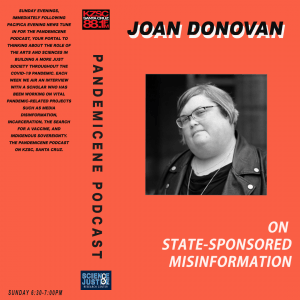The Pandemicene Podcast aims to produce knowledge that can help all of us – scholars and scientists, students and activists – imagine and enact just futures both in our home state of California and in our communities worldwide.

Airing on KZSC Santa Cruz 88.1 FM, on Sunday, October 25th,
6:30 – 7 pm PST.
Link to the live stream, or listen below (after the episode airs).
Welcome to the Pandemicene podcast, where we attempt to create knowledge that orients us towards justice at this critical historical juncture. Today we will be talking with Joan Donovan about state sponsored misinformation during the COVID-19 pandemic. What role does technology play in spreading or curbing disinformation? How can private media companies be held accountable and what can we as individuals do to respond to misinformation? Stay tuned to the Pandemicene podcast as we search for answers to these questions.
Guest Bio:
Joan Donovan is the Research Director of the Shorenstein Center on Media, Politics and Public Policy. Dr. Donovan leads the field in examining internet and technology studies, online extremism, media manipulation, and disinformation campaigns. Dr. Donovan leads The Technology and Social Change Project (TaSC). TaSC explores how media manipulation is a means to control public conversation, derail democracy, and disrupt society. TaSC conducts research, develops methods, and facilitates workshops for journalists, policy makers, technologists, and civil society organizations on how to detect, document, and debunk media manipulation campaigns.
Works Cited in Interview:
Donovan, Joan. “Don’t Panic: Care, Trust, and Mutual Aid During an Infodemic” Webinar. March 27, 2020.
Glaser, April. “Communities rally around one another — and Google Docs — to bring coronavirus aid.” March 20, 2010.
Gray, Mary L. and Siddharth Suri. Ghost Work: How to Stop Silicon Valley from Building a New Global Underclass. Houghton Mifflin Harcourt, 2019.
Additional Pandemicene Project Information
Find more information on the COVID-19 Pandemicene’s project page.
The SJRC has a robust network of local and international public health experts, scholars, and practitioners leading the way with collecting resources for teaching about COVID-19, writing open response letters, and calls to action, and organizing and participating in online events.
